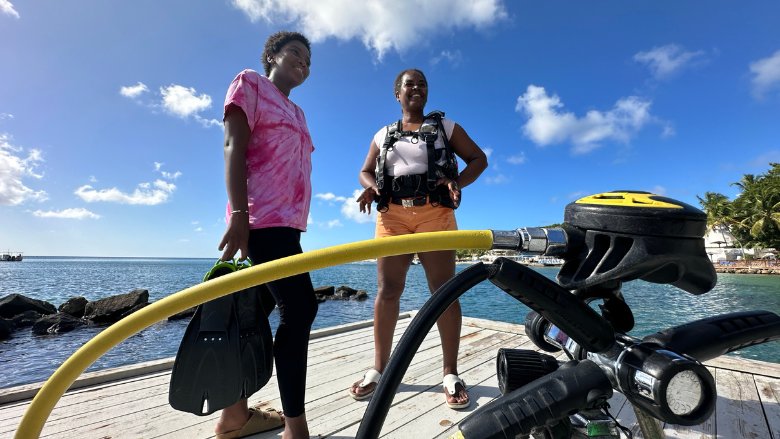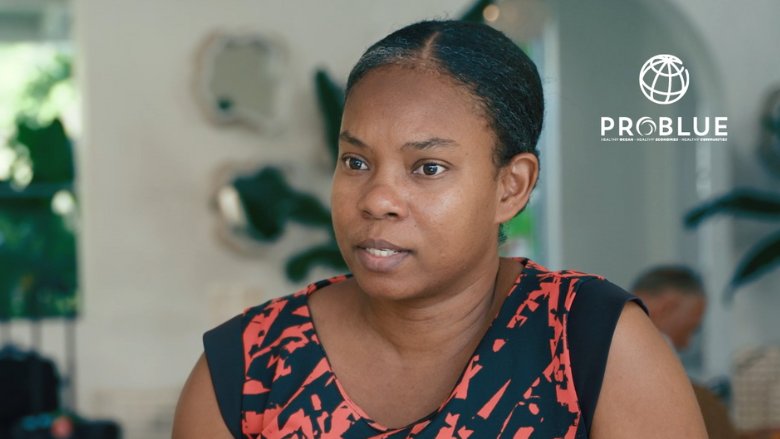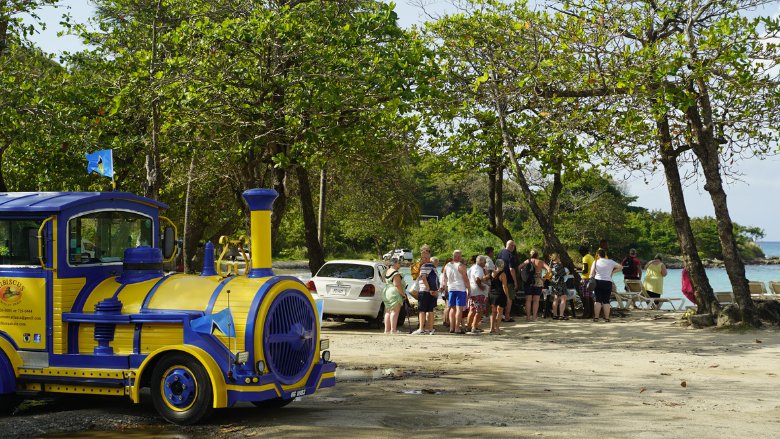As an entrepreneur, Eget Martyr struggled to establish credibility. “A lot of people thought entrepreneurship was not a woman’s world, and that I should not be part of it,” she says from the deck of Eastern Caribbean Diving, the company she owns and manages in Saint Lucia. After more than 30 years working in ocean tourism, she says making the decision to launch a small business changed her life. “I get to travel, I get to meet new people all the time, it’s very interesting, I don’t get bored. Also, I was able to at least earn an income that could take care of me and my family, send my kids to school, and I didn’t have to depend on somebody else to do that for me,” Eget shared.
Eget is a pioneer where women-run businesses are rare. Although female tertiary school enrollment is twice that of the male level in most Eastern Caribbean countries, the high human capital of Caribbean women has not translated into competitive opportunities in the labor market where they remain largely relegated to low-level, low-wage work, primarily in hospitality and tourism. The Unleashing the Blue Economy of the Caribbean Project (UBEC) is working to change that. A 15-year, $90 million initiative funded by the World Bank and the multi-donor ocean trust fund PROBLUE, UBEC is designed to accelerate the Blue Economy by increasing targeted investments in the fisheries, tourism, and waste management sectors in the Eastern Caribbean, strengthening the enabling environment for a diversified economy, and creating pathways to more ‘blue’ employment opportunities for women.
Strengthening resilience has never been more difficult or more necessary in the Eastern Caribbean. Like most maritime nations, these Small Island Developing States are facing profound challenges in tourism and fisheries, the two sectors most vital to their economies. Tourism has recovered to pre-pandemic levels, but relief is undermined by rising food and fuel prices and the high cost of living; marine fisheries, a critical source of jobs and food security, are facing critical issues with illegal, unregulated and unreported fishing resulting in depleted stock, and antiquated fishing processes that result in deteriorating safety and sanitation issues. The effects of limited waste management systems impact both the tourism and fisheries sectors: about 80% of marine pollution in the Eastern Caribbean is a result of land-based leakage—untreated wastewater, mismanaged litter, and agricultural run-off—that undermine the health of coastal fisheries, beaches, and the natural ecosystems that are home to populations and attract tourists.
Concurrently, with the accelerating impacts of climate change, coastal communities are becoming even more vulnerable to increasing sea temperatures which contribute to coral bleaching, further degrading the integrity and stability of the region’s reef systems and the myriad benefits they offer. Abigail Brown, 23, became a Master Diver at 21 and works alongside her mother, Eget, at Eastern Caribbean Diving. “Being here my whole life gave me the chance to experience my parents’ world as a young child, and to understand all about people and the ocean. I know that we benefit financially from the ocean. I see the bleaching of the coral reefs and I understand how the climate impacts our work and our community.”
Nadia Cazaubon, the Saint Lucia-based Program Director for NGO WaterWays in the Caribbean, and a former member of the Coast Guard, says she has witnessed changes to the ocean first-hand. “When I was a young girl, I would go bathing in the sea, and you would have schools of sardines. You would jump off the jetty and be surrounded by sardines, you could cup them in your hands and catch them. You don’t see that anymore. You can tell that the size of the fish has gotten smaller over the years because of fishing pressure in the near-shore environment—but we have fish resources that are not being tapped. From my experience in the Coast Guard and seeing how fishing is done in the U.S. there is money to be made in the Blue Economy.”
By expanding its sustainability offering, the Eastern Caribbean can build much-needed resilience, Nadia says. “The Blue Economy is vital for our people, number one. This is where we live, it’s our homeland for us to appreciate and enjoy and take care of. Saint Lucia’s economy right now is geared towards tourism. There’s a lot that’s not being tapped into… undiscovered resources that will benefit our country, other than tourism. But even within the tourism sector, there are untapped opportunities that people are not recognizing. In yachting, for example. There are a lot of services that sailors come onshore for, that they’re not able to get. A few years ago, there was a market needs assessment and there were over 50 different opportunities in terms of jobs and services that were being required that were not offered in Soufriere. You can imagine what that would be for the whole country.”
One of the key aspects of the Unleashing the Blue Economy of the Caribbean Project is to assist micro, small, and medium-sized enterprises to scale up operations and tap into the Blue Economy through a regional Matching Grants Programme that streamlines access to financing. Much of the Programme’s envelope is earmarked for female entrepreneurs, addressing a long-held difficulty in building a business. “One of the biggest challenges I had was access to financing,” says Eget, “which is still a problem today. You want to expand, you want to give opportunities to others, to young people, but you just don’t have the resources to expand.”
The Unleashing the Blue Economy of the Caribbean Project is a series of projects segmented into three phases of five years each. Phase one is underway through to 2028 in partnership with the Organization of Eastern Caribbean States Commission and includes Saint Lucia, Grenada, and Saint Vincent and the Grenadines, focusing on the linked Blue Economy sectors of tourism, fisheries, and waste management and collaborating at the national and regional levels to leverage economies of scale and provide pathways for a harmonized approach.
The Project is being implemented at the regional level by the OECS Commission and at the national level by project implementation units within the governments of the three project countries.



